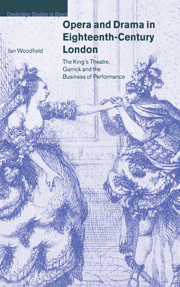 Opera and Drama in Eighteenth-Century London
Opera and Drama in Eighteenth-Century London Published online by Cambridge University Press: 22 September 2009
Charles Burney's melancholy account of the state of the King's Theatre in the 1750s leaves the reader in no doubt that Italian opera in London was in a state of very serious disarray, following a sequence of schisms, failures, bankruptcies and imprisoned or absconding managers. So bad had matters become that the spectre of imminent collapse seemed to hang over the opera house at the start of each new regime. Earl Cowper's second wife wrote to him on 24 January 1757: ‘I don't like ye new Opera so well as ye last, but there was a very full House on Satturday, to ye great joy of Giardini and Mingotti. I begin to think that ye operas will go on.’ It was apparently something of a surprise to her that the season was likely to continue at all. Burney thought that these two musicians had set themselves up for ‘the chance of speedy ruin’ by daring to take on the management of this problematic theatre. Managerial shortcomings were more than matched by the sense of artistic decline. Indifferent performers and an over-reliance on the pasticcio had become perennial problems. Until the arrival of Cocchi, there was not even a resident composer at this period.
To save this book to your Kindle, first ensure [email protected] is added to your Approved Personal Document E-mail List under your Personal Document Settings on the Manage Your Content and Devices page of your Amazon account. Then enter the ‘name’ part of your Kindle email address below. Find out more about saving to your Kindle.
Note you can select to save to either the @free.kindle.com or @kindle.com variations. ‘@free.kindle.com’ emails are free but can only be saved to your device when it is connected to wi-fi. ‘@kindle.com’ emails can be delivered even when you are not connected to wi-fi, but note that service fees apply.
Find out more about the Kindle Personal Document Service.
To save content items to your account, please confirm that you agree to abide by our usage policies. If this is the first time you use this feature, you will be asked to authorise Cambridge Core to connect with your account. Find out more about saving content to Dropbox.
To save content items to your account, please confirm that you agree to abide by our usage policies. If this is the first time you use this feature, you will be asked to authorise Cambridge Core to connect with your account. Find out more about saving content to Google Drive.